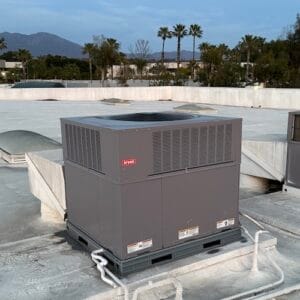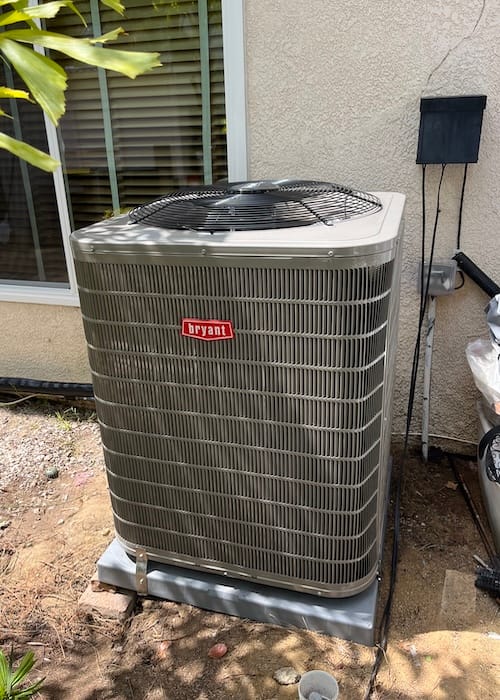


Your air conditioning system is an essential part, particularly in the sweltering summer months, and its effective functioning guarantees not only your comfort but also your financial and energy efficiency. The numerous advantages of routine AC maintenance tune up will be discussed in this article, ranging from increased indoor air quality and energy efficiency to fewer AC tune up service calls and a longer system lifespan.
We'll get into the specifics of why these benefits are significant and how they help create a more comfortable, cost-effective, and healthy living space. This article will answer what is an AC tune up, whether your goal is to save your energy costs, prolong the life of your air conditioning system, or just guarantee a continuously tune up specials.
For your air conditioner to operate effectively and efficiently, the filters, coils, fins, and refrigerant lines must all need routine HVAC tune-up. Performance deteriorates and energy consumption rises when maintenance is neglected.
Without an AC tune up necessary, your conditioner just won’t run as well as it should. You should schedule repair if you notice uneven cooling in your house, with one area feeling like an oven and another like an icebox.
Your air conditioner tends to lose cooling efficiency as parts undergo normal wear and tear and dust accumulates inside the system. Your family’s house becomes less pleasant as a result.
Certain tasks, like cleaning or troubleshooting, can be completed by you, while other tasks are best left to an HVAC specialist. They have the instruments and equipment necessary to complete the task effectively and safely.
Here are all the benefits you can access, when scheduling a home AC tune up:
Cleaning or replacing air filters as part of routine maintenance helps keep dust, allergies, and pollutants from building up within your house. You and your family will breathe cleaner, healthier air as a result.
Airflow is decreased by dirty or clogged filters, which makes it more difficult for your air conditioner to efficiently cool your room. You can guarantee enough airflow, improve cooling efficiency, and create a more comfortable living space by routinely cleaning or replacing your filters.
By keeping components clean and in top shape, routine maintenance lessens wear and tear on them. By postponing the need for expensive replacements, this increases the overall lifespan of your air conditioning system and ultimately saves you money.
Frequent inspections can identify small faults before they become larger ones that need costly repairs. In addition to saving you money, taking care of possible issues early on guarantees continuous comfort during the sweltering summer months.
When submitting a warranty claim, many manufacturers want documentation of routine maintenance. You can avoid having your warranty coverage for repairs or replacements denied by following a maintenance program.
If your air conditioner is making noises, don’t ignore them because they could get worse over time. You should get in touch with a nearby AC maintenance agency to have the problem evaluated if you start to hear strange noises like clicking, pounding, or screeching.
Your air conditioner is definitely in need of repair if it is sending out warm air or is just not cooling down adequately. It might be time for a professional cleaning of the AC coils, a refrigerant refill, or a filter replacement.
Additionally, you may have noticed that your power bills have increased over the past few months. Air conditioners lose efficiency as they age and frequently require maintenance to maintain optimal performance.
What does an ac tune up include? To guarantee correct functioning and energy efficiency, a professional air conditioning tune-up entails a comprehensive inspection procedure that includes cleaning, adjusting, and testing different HVAC system components.
How to tune up ac unit? To make sure that air is moving through the system effectively, an HVAC specialist will examine and clean the blower motor, condenser coils, and evaporator coil during the service. In order to avoid any possible safety risks, electrical connections will be examined and strengthened.
To make sure your air conditioner operates at the appropriate temperature, the technician will also inspect the thermostat to confirm its accuracy and functionality. To avoid obstructions that can result in damage or decreased cooling effectiveness, other important parts, like the condensate drain, are examined and cleaned.
Particularly in dusty settings or when there is greenery close by, outdoor condenser coils can get extremely dirty. To guarantee proper airflow, keep the space surrounding the condenser unit clean and clear away any trash at least two feet away.
In essence, the condenser unit is what powers the air conditioner. Overheating will cause the system to malfunction. A qualified air conditioner tune up should pay attention to the coils and, if necessary, clean or replace them. This could have the biggest impact on averting a system failure out of all our central air conditioning tune up advice.
We use an extremely accurate gauge to assess the levels of refrigerant. The cooling process in your system is made possible by refrigerant. Your system will be less effective and at risk if the refrigerant level is either low or too high.
Our technicians look for physical damage on the refrigerant lines. A damaged refrigerant line can start to leak, but anything as basic as a stone bouncing off a lawn mower can cause harm. You won’t have air conditioning until the problem is rectified if your unit leaks too much refrigerant.
For split system air conditioners to operate at their best and last a long time, professional maintenance is essential for lubricating the moving parts.
To ensure that the suitable lubricants are used and applied in the right proportions, it is strongly advised to hire a professional technician to carry out these lubrication services. These experts have the know-how to spot such problems early on, averting future expensive repairs or replacements.
Additionally, lubricating moving parts with professional maintenance will help the air conditioning system operate more efficiently, which will use less energy and result in cheaper utility bills. You can rest easy knowing that your system is in capable hands and will continue to function properly for many years to come if you entrust this task to seasoned experts.
Your air conditioning system’s command center is your thermostat. Your home will be efficiently cooled at the temperature you want if your thermostat is operating properly.
Your energy consumption can be significantly reduced by paying attention to the temperature you set on your thermostat. In order to balance comfort and energy efficiency, the Department of Energy advises setting the thermostat to 78°F throughout the warmer months.
Consider creating a timetable that fits in with your everyday schedule if you don’t already have a programmable thermostat. By changing the temperature while you’re sleeping or away from home, this can help save electricity.
One of the most crucial parts of the air conditioner is the filter. The cooling device may experience increased wear and tear as a result of a filthy filter. You need to check the filter in the beginning of the summer.
You should clean the filter or replace it if it’s unclean. An effective airflow is ensured with a clean filter. The efficiency of the air conditioner will rise as a result. Because an effective air conditioner won’t use too much power, energy bills will go down.
Technicians check the ductwork for obstructions and other problems that can obstruct airflow during an AC tune up. After blockages have been identified, the duct system’s air flow is restored. A clear duct improves the AC system’s operation and helps with energy efficiency.
Potential problems in your ductwork can also be found with professional air duct cleaning. For instance, the technician doing the work can discover leaks or corrosion in the ducts. Given that leaky ducts can waste a significant amount of your cooling (and heating) energy, it is best to have those damages repaired as soon as possible.
An essential component of the HVAC tune up checklist is electrical system testing. To make sure everything is safe and secure, technicians check the electrical wiring for correct ratings and connections.
This includes testing the safety controls, such as functional thermostats and emergency shut-off switches, to prevent hazards like overheating or electrical failures in heating systems. By including these checks into routine tune-ups, system failure can be avoided and effective functioning is guaranteed.
Your drain line may eventually start to leak. The condensate drains help remove condensation from the system and transport it outside of your house, making this line a crucial component of your system.
Water will be building up around the unit if the drain pipe is plugged. System failure may occur if the water seeps into the system. It’s crucial to routinely inspect the drain line to prevent this fate. You should have a technician make the required repairs if there is a leak or a clogged drain line.
Despite being a necessary component of home comfort, air conditioning may be costly. Thankfully, there are a number of methods to increase the efficiency of your air conditioner and reduce your costs. Although some of the actions may require time, they may eventually result in energy cost savings of hundreds of dollars.
Checking and replacing the air filter is the first step to utilizing AC unit tune up efficiently. You should replace your air conditioner’s filter every six months, regardless of whether it’s integrated into the unit or is mounted separately on your ductwork. Using high-quality filters that are kept clear of debris and clean is crucial. Never let water or moist air come into contact with the old filter; instead, clean it with a dry towel.
You can reduce your energy costs by using an AC controller or smart thermostat. An electronic device called a thermostat regulates the temperature of a building. Nowadays, a lot of thermostats have internet connections and come equipped with functions like geo-fencing, scheduling, and remote access.
Make sure the air conditioner is not too large for the space if you want to reduce your energy costs. Use a room calculator that will help you calculate what size of AC would be appropriate for your space. It might be advantageous to purchase many smaller units rather than a single large unit if you have several rooms. This will reduce your overall electricity expenditures and enable you to adopt more efficient models.
Regular AC repair should be planned for early spring each year. Targeting the early spring months has a number of advantages.
First, there’s a strong demand for AC tune-ups, so getting on the schedule earlier helps ensure you’ll get your system looked at before things heat up.
Second, you never know when that first hot weekend will arrive, since it seems to come out of nowhere. Prior to turning on your air conditioner for the first time, you want your tune-up completed.
You’re capable of more. Seek out businesses that provide more thorough tune-ups and introduce what is included in an AC tune up. Tasks like monitoring refrigerant levels, assessing performance, inspecting mechanical elements like motors and capacitors, and lubricating moving parts should all be part of a professional tune-up.
One of the most crucial aspects of house maintenance is caring for your air conditioner in the spring. It not only guarantees that your system functions effectively, but it also gives your family a more comfortable environment and cleaner air. Cheers to the days ahead!
Does your air conditioner require maintenance to maintain optimal performance? And what happens during a tune up? Have faith in the skills of Go-Tech, the HVAC maintenance issue solvers. Your AC system will be fine-tuned by our experts to guarantee peak efficiency